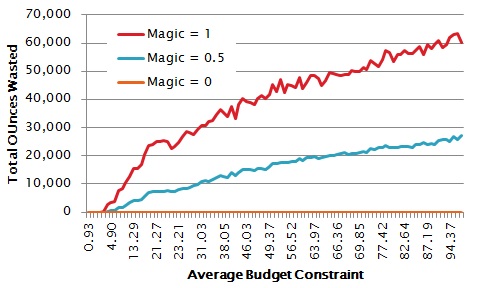In the second component of the Consumer Choice and Sustainability project, we are working to integrate magical thinking and norms of frugality into the basic satificing/maximizing framework. Magical thinking occurs when consumers expect that the purchase of a good will provide some benefit over and above the intrinsic utility of the item. When this benefit does not materialize, then consumers search for and purchase a new “magical” product. We hypothesize that higher levels of magical thinking will increase total consumption and waste in the system as agents learn the intrinsic utility of goods. We also expect that introduction of “new and improved” goods will lengthen the period of waste as consumers with high tendencies for magical thinking continually try these new products. As shown in the figures below, preliminary results support these hypotheses. Agents with higher “magical tendency” tend to consume and waste more than agents with lower magical tendency. These results are promising but additional verification and validation are needed.
Norms of frugality are important for the CCS project as well because If there are strong social norms against wanton disposal of goods, then consumers should be more likely to select durable goods and to use them up before purchasing new items. These types of norms could negate the higher levels of consumption of waste that we observe in models of satisficing and magical thinking. Our current implementation of norms of frugality is quite simple; we impose a uniform, exogenous threshold across all individuals. In the future, we plan to allow for variation in thresholds and endogenize frugality by networking agents. Additional details on model specifications can be found in Webster and Roozmand (2014), which is available on request from the authors.
References:
Webster, D.G. and Omid Roozmand. 2014. Discards and the Anthropocene: Satisficing, magical thinking, and norms of disposability (CCAD project). Annual Meeting of the Association for Environmental Studies and Sciences, June 11-14, New York, New York.



